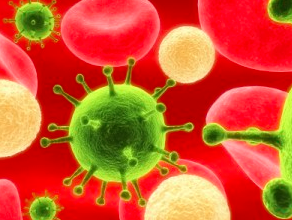Feline immunodeficiency virus, often known as the feline form of HIV, can sound pretty ominous. Actually most FIV cats who are not showing signs of their disease can live long lives. Of course early screening and prevention are invaluable, but knowledge can help you give your FIV-positive cat a longer, happier life. Read on....
WHAT?
Feline Immunodeficiency Virus (FIV) is a disease that affects 2-3% of cats nationwide. FIV causes suppression of the immune system, limiting the cat's ability to protect him/herself against other secondary infections. While the virus does share some similarities with HIV, FIV can be spread only between cats - humans cannot catch FIV.
HOW?
Biting and fighting are the most common ways to spread the disease, putting outdoor, non- neutered cats at highest risk. FIV does not seem to be commonly spread through sharing food bowls and litter boxes, social grooming, sneezing or other casual kinds of contact. On rare occasions, infection is transmitted from an infected mother to her kittens, usually during passage through the birth canal or when the newborn kittens ingest infected milk. Sexual contact is not a major means of spreading FIV.
SIGNS?
Once infected the cat may not show signs for many years. However, once symptoms do develop, they usually progress swiftly. Also a cat may show signs of sickness interspersed with health for years.
Cats are true masters at hiding disease. Early signs of infection are often subtle and missed - "My cat just doesn’t feel right." These signs might include decreased appetite, decreased energy and poor grooming. As infection becomes more advanced, you may see the following signs:
- Marked loss of appetite
- Weight loss
- Weakness
- Pale gums
- Mouth sores
- Persistant diarrhea
- Enlarged lymph nodes
TESTS?
All kittens and new adult cats should be tested for the disease prior to introduction into the home. Since it is possible for an infected mother to transfer FIV antibodies to her kitten, these kittens may test positive from their mother’s antibodies until they have cleared them from their systems, which usually happens by 6 months of age. Any kitten less than 6 months old who tests positive to FIV, should be re-tested at a later day to see if they are truly infected. Any adult cat who spends time outdoors or who spends time with cats who spend time outdoors, should be tested annually for this disease, or whenever they appear ill. A simple blood test that checks for FIV antibodies can usually be done quickly and easily in-hospital. Occasionally additional testing is required to confirm a positive or negative result. Once a cat is determined to be FIV-posiitve, that cat is capable of transmitting the disease to other cats - see HOW? above. Early detection will help you maintain the health of your cat and prevent the spread of infection to other cats. With proper care, infected cats can live long and healthy lives.
It takes 8-12 weeks after infection (and sometimes longer) before detectable levels of antibody appear, so if the test is performed during this time, a truly FIV-infected cat may still test negative. Cats with a known or possible exposure to FIV-infected cats should be re-tested at least 60 days after the potential exposure to allow adequate time for the development of antibodies. Rarely truly FIV-positive cats will test negative in the later stages of their disease because their immune systems are so compromised that they can no longer produce detectable levels of antibody.
TREATMENT?
While there is no cure for FIV infection, there are several things you can do to help an infected cat lead a normal life. Keep in mind that cats can carry the virus for a long time before symptoms appear. Therefore, treatment focuses mainly on extending the asymptomatic period or, if symptoms have set in, on easing the secondary effects of the virus. Remember that your cat may appear healthy on the outside when there may be an underlying condition, like anemia, occurring on the inside. Regular semi-annual blood and urine tests and x-rays to check general organ systems become especially important in the FIV-positive cat to monitor for secondary complications. Proper nutrition and supplements can also keep your FIV-positive cat from feeling the effects of his/her disease. Leading a strictly indoor lifestyle will prevent continued spread and reduce the FIV-positive cat’s exposure to other infectious organisms.
PREVENTION?
Test any new cat prior to introduction into the home. A strictly indoor lifestyle, including one that does not expose strictly indoor cats to those that do spend time outdoors, eliminates the risk of contracting FIV. And of course make sure that your cat is neutered - so important for all cats, not just FIV-positive ones.
VACCINE?
Vaccines designed to help protect against FIV infection have been available but not all vaccinated cats will be protected by the vaccine. In addition, vaccination often influences future FIV test results, making them more difficult to interpret. It is important that you discuss the advantages and disadvantages of vaccination with your veterinarian to help you decide whether an FIV vaccine should be administered to your cat. Most veterinary hospitals, including DTLAvets, do not routinely carry the FIV vaccine - preventing exposure remains the most important form of protection.
Call DTLAvets today and schedule an appointment today to discuss how to we can help to keep your cat healthy year-round!
